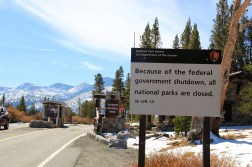When faced with idleness, the government’s furloughed workers are responding with action.
Furlough appeal applications are inundating the Merit Systems Protection Board at an unprecedented rate, with more than 2,500 already processed and nearly 3,000 more waiting in the wings, an agency official said July 19.
The 5,000-plus appeals have mostly flowed in over the last 10 days, and the office has authorized temporary overtime for support staff to handle the deluge. With unions still rallying employees to appeal, and the number of appeals only days away from overtaking the MSPB’s usual yearly intake of 6,000 to 7,000 appeals, it’s unclear how long it will take to handle all the requests. The office’s goal — as stated in the response it sends to an appeal filer — is to turn it around in 120 days.
It’s literally uncharted territory — never before has MSPB had to hear cases on furlough appeals.
The start of Defense Department furloughs July 8 apparently opened the floodgates; 84 percent of the 2,507 docketed furlough appeals are from DOD employees. Another 2,850 appeals are still being processed, but MSPB Clerk of the Board William Spencer said it’s “very likely” most of those are also furlough related.
John Calhoun filed one of those docketed appeals. He works in the Columbus, Ohio, office of the Defense Logistics Agency, and is president of the local chapter of the International Federation of Professional and Technical Engineers, which has 240 members. Each member stands to lose between $5,000 and $6,500 in salary and benefits from the furloughs, Calhoun said.
Speaking from his house — he was furloughed on Friday — Calhoun said about 50 local union members have already filed appeals with more coming during another round Wednesday.
But that’s nothing compared to the number of DOD employees who want to appeal, in his opinion.
“Most people fear doing it because the No Fear Act does not work in the Department of Defense,” Calhoun said, referring to the DOD directive that employees will not be retaliated against for filing employment discrimination claims. “Most people fear retaliation from management because they fear for their work and they fear for the possibility of ever being promoted.”
Calhoun’s salary — and that of 180,000 other furloughed workers — comes out of the Defense Working Capital Fund, which is not funded through direct congressional appropriation. Instead, the fund operates on a break-even basis, generating sales revenue that evenly offsets its costs. DLA, for instance, provides replacement ship parts to naval bases or vehicle parts to military bases in Afghanistan. Technically, the taxpayer takes no hit.
Legally, these 180,000 workers have a different set of workforce protections than workers directly funded by Congress.
Which forms the crux of Calhoun’s appeal: His furlough is not legal, nor does it save money. And he is not the only one with this concern. In June, more than two dozen lawmakers sent Defense Secretary Chuck Hagel a letter asking for the legal justification DOD was using to furlough these employees “despite the explicit protections afforded them under this statute” and the economic rationale for why DOD believes the furloughs “would reduce its operating expenses.”
DOD Comptroller Robert Hale replied in a detailed July 5 letter that, yes, DOD had the legal ability to impose short-term furloughs on working capital fund workers and, yes, it “will result in personnel cost-savings.”
“These working capital fund personnel savings provide us the flexibility to adjust maintenance funding downward to meet higher-priority needs,” Hale wrote.
Government employees can contest a furlough after receiving advanced notice, but cannot officially appeal to MSPB until after they have actually been furloughed. Each employee is required to file individually — rather than by region or office — because a furlough is considered an “adverse action” against an individual employee rather than an entire agency. This has made MSPB’s burden even heavier.
In an effort to speed things up, MSPB’s regional offices is considering bundling similar cases to issue a combined ruling. Processing each appeal separately could cost MSPB upward of $10,000 per appeal, according to a February interview GovLoop did with John Mahoney, partner at Tully Rinckey and chair of the law firm’s labor and employment law practice group.
But Calhoun’s IFPTE has vociferously pushed for individual hearings.
“Each individual worker is entitled to a thoughtful and thorough decision by the board instead of the assembly line justice approach,” the organization wrote in a letter to MSPB Chairwoman Susan Tsui Grundmann.
Which leaves all involved parties in a bind: aggrieved employees; an overwhelmed MSPB; and frustrated, yet inactive, lawmakers.
And DOD doesn’t appear ready to budge. But the pressure is building. The National Federation of Federal Employees threw its support Thursday behind a congressional amendment that would ban furloughs of working capital fund workers in 2014. The American Federation of Government Employees, which represents the bulk of the furloughed DOD employees, is still facilitating furlough appeals.
With until Aug. 8 to postmark an appeal, it’s hard to know when, or if, the pressure will stop.






